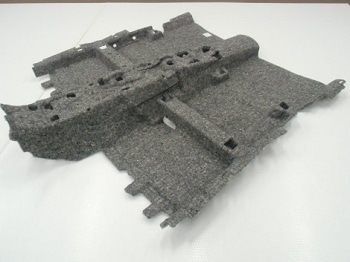Teijin Limited and Hayashi Telempu Corporation announced today that Hayashi Telempu’s V-Wave™ soundproof material made with Teijin’s V-Lap™ nonwoven polyester fabric has been selected as soundproof material for the 2016 Toyota Prius, which launched in Japan in December 2015.

Nonwoven structure with vertically oriented fibers of V-Lap™ enables V-Wave™ to perform every bit as well as conventional soundproof material, yet weighs only half as much. V-Lap™ is also an environmentally friendly because it is made with recycled polyester.
As environmental regulations become increasingly strict worldwide, there are growing demands for solutions that help to improve vehicle fuel efficiency, including weight reduction. Teijin and Hayashi Telempu are also using V-Lap™ and V-Wave™ to develop other lightweight sound-absorption auto parts, such as for ceilings and doors.
V-Lap™ and V-Wave™ are mutually produced in contiguous factories located in Gifu Prefecture, Japan.
About V-Lap™
V-Lap™ is a nonwoven fabric comprising fibers that are oriented vertically (upward). It is made with a unique manufacturing method to produce a structure that is bulky, lightweight and easy to mold. V-Lap™ was first utilized as a cushioning material for items such as bedding, and now its superior sound-absorbing property has led to its use as a soundproofing material for vehicles.
Teijin is also developing V-Lap™ as a heat-insulating material for next-generation houses and as a super-lightweight ceiling material. As a nonwoven product, V-Lap™ can be bonded to other films through composite fabrication.
About V-Lap™ Plant
Teijin’s Nonwoven Fabric Plant, which is located on the premises of Toho Tenax’s Ibigawa Plant in Gifu Prefecture, began operating in January 2015.
About V-Wave™
V-Wave™, a lightweight, high-performance soundproof material manufactured and supplied by Hayashi Telempu, is made with Teijin’s V-Lap™ nonwoven fabric fiber to reduce weight to only half that of conventional soundproofing materials. It was first introduced as a sound-absorbing material for vehicle floors in 2012 and is currently used in automobiles worldwide.
About V-Wave™ Plant
Hayashi Telempu’s Oogaki Plant, also located on the premises of Toho Tenax’s Ibigawa Plant in Gifu Prefecture, began operating in November 2015.